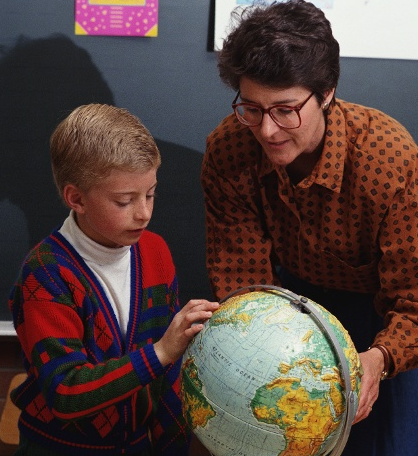A Special Thank You to a Special Teacher
A Former Student with Autism Shares his Gratitude for a Teacher that Helped Him Succeed
When I was growing up, school was very rough for me. I struggled with many of the same social and emotional challenges that many others on the spectrum had, and each day I am thankful for the fact that I survived. However, there were some school years that were better than others. I smile as I remember certain teachers who encouraged me to try my best and were forgiving of the challenges that I had, and I remember other teachers with frustration as memories of meltdowns and misunderstandings play in my mind. I could write an entire book about the latter, but I now want to focus on a teacher who truly helped me as I attempted to succeed in a mainstream elementary school setting. I will give her the pseudonym of “Mrs. Johnson,” although this teacher deserves to be known.
This story begins in June 2000, when I finished second grade. This year ended on a very negative note. I was having one meltdown after another and my teacher appeared to be somewhat resentful of my being in her classroom. I was constantly being sent out of the room and, at times, was physically restrained. I do not blame her for this, as there were no resources that were available to her at the time, and there was also not the emphasis on positive behavioral supports that there is today. However, this did not change the fact that I was so distraught and broken by the end of the school year that my mother told the district that she was considering homeschooling for the next year. This was not to be, as my mother went into mediation with the school that summer and convinced them to provide me with the services that I needed. I would be attending public school after all.
 My mother took me to meet Mrs. Johnson about three days before the start of school. The purpose of this was to help me become acclimated to the classroom environment and to allow me to start the year on a positive note. I remember to this day that she was holding a book about Asperger’s Syndrome when we walked in the room. This surely left a positive impression on my mother, as it showed that Mrs. Johnson was committed to helping me succeed in the mainstream. I was also allowed to roam the classroom in order to see where I would be spending the next 9 months. I looked at the names on the desks to see if I recognized anyone who would be in my class, and I excitedly ran to my mother when I saw the name of someone who I considered a friend. When I left the classroom, I felt welcomed by my new teacher and excited to start fresh in a new year.
My mother took me to meet Mrs. Johnson about three days before the start of school. The purpose of this was to help me become acclimated to the classroom environment and to allow me to start the year on a positive note. I remember to this day that she was holding a book about Asperger’s Syndrome when we walked in the room. This surely left a positive impression on my mother, as it showed that Mrs. Johnson was committed to helping me succeed in the mainstream. I was also allowed to roam the classroom in order to see where I would be spending the next 9 months. I looked at the names on the desks to see if I recognized anyone who would be in my class, and I excitedly ran to my mother when I saw the name of someone who I considered a friend. When I left the classroom, I felt welcomed by my new teacher and excited to start fresh in a new year.
Luckily, the first day of school was exactly as I had hoped. Mrs. Johnson was committed to making sure that all of her students were successful in her classroom, regardless of their strengths and challenges. This meant that I was not singled out in any way, even though I had an aide who was assigned to me and another student in the class. I quickly became known in the class for my sense of humor, and I clearly recall students gathering around the classroom computer to read an autobiography that I wrote for “back-to-school night” and laughing at the jokes that I included in it. Unlike other teachers who would have seen my autistic traits and my silly personality as a burden, Mrs. Johnson saw these as openings for me to gain social connections and friendships.
Mrs. Johnson was also understanding of the emotional needs of an autistic student. For example, I needed a certain degree of routine during the school day, and Mrs. Johnson was more than able to provide me with that type of structure. There was a schedule that was strictly followed on a daily basis, and the day’s activities were clearly visible on a chart in the back of the classroom. However, I also needed a teacher who would be sympathetic if I was struggling or if I needed to deviate from the established classroom routine. In other words, it was expected that I complete my work and follow the classroom rules, but Mrs. Johnson was more than understanding if I needed to take a 10-minute walk or if I needed my assignments to be modified in any way (i.e. less math problems on a homework sheet so that I would not be overwhelmed).
Due to this newfound respect that I gained in the classroom, I recognized that I needed to work hard to keep this respect. At the beginning of the year, I made an active effort to keep my emotions at bay and not show any signs of disruptive behavior, even when I was very excited or very upset. I wanted to make a good impression for the teacher who had welcomed me in the classroom so warmly. As months passed and I felt more comfortable in the classroom, I had some behavioral difficulties that were consistent with autism but not as severe as those I had during the previous school year. I had issues with basic social conventions such as winning and losing, turn-taking and not being chosen in class. I did not recognize that I could not be called on for everything, and I did not understand that my selfishness in this area could upset others. I did not want to make others angry with me, but this inevitably happened over time. Mrs. Johnson was usually there to help me out and explain social rules in a way that I could understand, while my old teachers would have sent me out of the class if I showed frustration with these rules. Granted, there were times when I needed to leave the classroom for brief periods of time, but this was just to help me gain control over my behavior. It was never used as the first resort for dealing with difficult situations, and I will always respect Mrs. Johnson for this.
In May, the annual Teacher Appreciation Week was held at the school that I attended. When my mother thought about everything that Mrs. Johnson had done to help me over the course of that school year, she wanted to use this special occasion to recognize Mrs. Johnson. At the beginning of the week, my mother wrote a letter to the principal of the school explaining why, in honor of Teacher Appreciation Week, Mrs. Johnson should be appreciated for her hard work and excellence in teaching. I wish that I still had that letter in my possession so that I could share it with others, and they could understand how appreciative parents are of teachers who support their students with autism.
I hope “Mrs. Johnson” sees this blog and recognizes herself.
Is there a special teacher your child would like to say "Thank You" to? Please enjoy our free worksheet to guide your child in sending a message of appreciation to their favorite teacher.

Nathan Hughes
Nathan Hughes is a recent graduate of Lesley University, where he received his Master’s Degree in Education of Students with Moderate Disabilities in Grades 5-12. He is also a graduate of Salem State University, where he received a Bachelor’s Degree in English. As someone who is on the autism spectrum, Nathan’s goal is to work in educational research and to contribute to a better understanding of autism.





